If you own a bearded dragon, you might be curious: can bearded dragons have peaches? These fascinating reptiles require a balanced diet to stay healthy and active. Knowing which fruits and vegetables to include is essential for their well-being. Peaches are a sweet and juicy fruit that many pet owners consider offering as a treat. However, it is important to understand whether peaches are safe and beneficial for your bearded dragon before adding them to its diet.
In this article, we will answer the common question, can bearded dragons have peaches? We will explore the nutritional value of peaches, including their vitamins and minerals. Additionally, we will discuss any potential risks associated with feeding peaches to your pet. Understanding these factors helps you make the best decisions to keep your bearded dragon healthy and happy.
Beyond just peaches, we will also cover how to prepare this fruit safely, how often to offer it, and suggest other fruits and vegetables that complement a bearded dragon’s diet. Whether you are a new reptile owner or have cared for beardies for years, this guide will provide clear, expert advice on including peaches in your pet’s menu responsibly.
By the end, you will know exactly how to answer the question, can bearded dragons have peaches? and feel confident feeding your pet this delicious fruit in a way that supports its overall health.
Can Bearded Dragons Have Peaches? The Quick Expert Answer
So, can bearded dragons have peaches? The quick expert answer is yes, but with caution. While the nutritional value of peaches for reptiles like the bearded dragon (Pogona vitticeps) offers some benefits, it’s important to understand are peaches safe for bearded dragons and how they compare to other safe fruits such as apples and berries.
Nutritional value of peaches for bearded dragons and reptiles
Peaches contain several key nutrients beneficial to bearded dragons and other reptiles. They provide Vitamin A, which plays a vital role in maintaining good vision and a strong immune system. Alongside this, peaches are rich in Vitamin C, an antioxidant that supports overall health by reducing oxidative stress. Another valuable nutrient in peaches is potassium, which supports proper muscle activity and helps maintain fluid balance within the body. Additionally, the high moisture content found in peaches contributes to keeping your bearded dragon well-hydrated, a benefit that is especially useful during hotter weather. While peaches offer these important nutrients, their natural sugars mean they should be fed sparingly as a treat, not a regular part of the diet. The nutritional value of peaches makes them a flavorful and healthful option when offered responsibly.
Are peaches safe for bearded dragons to eat regularly?
When considering are peaches safe for bearded dragons, it’s important to note that peaches can be fed but not on a regular basis. They contain natural sugars and a calcium-to-phosphorus ratio that is not ideal for frequent feeding. Too much phosphorus can interfere with calcium absorption, leading to health issues like metabolic bone disease. Therefore, feeding peaches to bearded dragons should be limited to an occasional treat, roughly once or twice a month. Peaches are among several safe fruits for bearded dragons, but portion control is key to avoid digestive upset or weight gain. Always remove the skin and pit before offering peaches, as these parts can cause choking or digestion problems. By following these guidelines, you can safely include peaches as a tasty and nutritious treat without compromising your pet’s health.
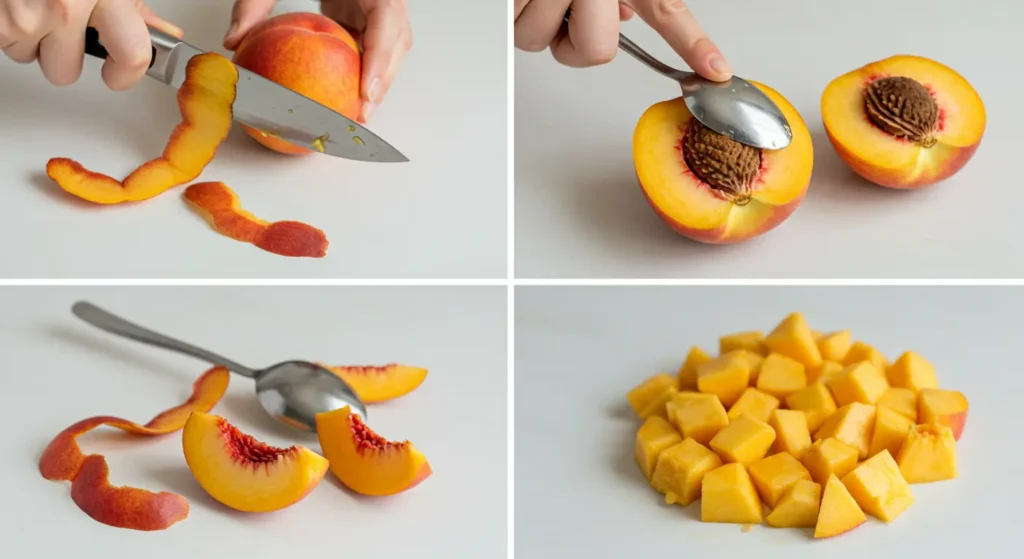
Comparing peaches with other safe fruits for bearded dragons
When choosing safe fruits for bearded dragons, peaches are best offered as an occasional indulgence rather than a dietary staple. In comparison, fruits like blueberries contain less sugar and have a more favorable calcium-to-phosphorus ratio, making them a healthier option overall. This is a key factor in the peaches vs blueberries debate among reptile keepers aiming for optimal nutrition. Blueberries also provide antioxidants and essential vitamins with minimal risk of digestive upset. Other fruits considered ideal for bearded dragons include seedless apples, strawberries, and papaya. These options tend to be gentler on the digestive system while supplying important nutrients. Although peaches provide hydration and a sweet taste, offering a diverse selection of fruits in controlled amounts promotes a well-rounded diet and supports the overall vitality of your bearded dragon.
Nutritional Benefits and Potential Risks of Peaches for Bearded Dragons
Understanding the benefits of peaches for bearded dragons is important, but it’s equally crucial to recognize the risks of feeding peaches to bearded dragons. Peaches are a tasty fruit, yet their high sugar content and unbalanced calcium-to-phosphorus ratio in peaches can affect your pet’s health. Being aware of these factors helps prevent issues like Metabolic Bone Disease (MBD) and other problems related to excessive sugar intake in reptiles.
Vitamins and minerals in peaches (Vitamin A, Vitamin C, potassium)
Peaches provide important vitamins in peaches that benefit bearded dragons’ health. One of the key nutrients is Vitamin A, which supports good eyesight and a strong immune system. This vitamin is crucial for maintaining healthy skin and mucous membranes. Peaches also contain Vitamin C, an antioxidant that helps protect the body from cell damage and supports tissue repair. In addition to vitamins, peaches offer essential minerals in peaches, especially potassium. Potassium plays a vital role in regulating muscle function and maintaining proper hydration by balancing fluids within the body. The combined nutritional content of peaches makes them a nutritious treat when given in moderation. Although peaches are not a staple food, their vitamins and minerals contribute positively to your bearded dragon’s overall diet.
High sugar fruits and their effect on bearded dragon health
Feeding bearded dragons high sugar fruits for reptiles requires caution. Fruits like peaches have a significant sugar content, which can lead to health problems if consumed too often. Excess sugar may cause sugar and obesity in bearded dragons, increasing the risk of fatty liver disease and other metabolic disorders. High sugar intake can also upset the digestive system, resulting in issues like diarrhea or bloating. These are common concerns linked to fruits that cause digestive problems when offered frequently or in large quantities. To maintain your pet’s health, it’s best to limit sugary fruits to occasional treats. A diet focused on low-sugar vegetables and protein-rich insects helps keep your bearded dragon healthy and prevents the risks associated with too much sugar.
Calcium-to-phosphorus ratio in peaches and reptile bone health
The balance of calcium and phosphorus in a bearded dragon’s diet is vital for strong bones and overall health. Peaches have an unfavorable calcium to phosphorus ratio, containing more phosphorus than calcium. This imbalance can hinder calcium absorption in bearded dragons, which is necessary to build and maintain healthy bones. Insufficient calcium intake can lead to metabolic bone disease, a serious condition affecting bone health in reptiles. Because of this, peaches should only be given sparingly and should never replace calcium-rich foods or supplements. To ensure proper skeletal development, bearded dragons require a diet rich in leafy greens and calcium sources. Monitoring and managing this mineral balance helps keep your reptile’s bones strong and prevents long-term health problems.
How to Prepare and Serve Peaches to Bearded Dragons Safely
When it comes to how to feed peaches to bearded dragons, proper preparation is essential for their safety and health. This section will guide you through the best methods of preparing peaches for bearded dragons, highlighting the differences between fresh and canned peaches, and explaining why removing the skin and pits is crucial. Understanding these steps helps ensure your reptile enjoys this tasty treat without any risks from peach pits, fruit pesticides, or other hazards during reptile diet preparation.
Choosing fresh peaches over canned or preserved varieties
When feeding peaches to your bearded dragon, always opt for fresh peaches for bearded dragons rather than canned or preserved varieties. Canned peaches often contain added sugars, syrups, and preservatives that can be harmful to reptiles. These peach preservatives dangers include chemicals that may upset your pet’s digestive system or cause long-term health issues. Fresh peaches retain their natural nutrients without any artificial additives, making them a safer and healthier choice. Always wash fresh peaches thoroughly to remove any pesticides or dirt before offering them to your bearded dragon. Choosing fresh over canned ensures your pet receives the best nutrition while avoiding unnecessary risks.
Can bearded dragons eat peach skin or pits? Safety tips explained
When wondering can bearded dragons eat peach skin, it is best to avoid feeding it to them. The skin of peaches can be tough to digest and may contain pesticide residues, which can harm your reptile. More importantly, are peach pits toxic to bearded dragons? Yes, peach pits pose serious health risks. They are a major choking hazard for bearded dragons and can cause intestinal blockages if swallowed. Additionally, pits contain trace amounts of cyanide compounds, which are toxic to reptiles. Always remove the skin and pits carefully before feeding peaches to your bearded dragon to keep them safe and healthy.
Cutting peaches into safe bite-sized pieces for reptiles
Properly cutting peaches into safe bite-sized pieces for reptiles is essential for easy digestion and to prevent choking. When preparing peaches for feeding, slice the fruit into small, manageable pieces that fit comfortably in your bearded dragon’s mouth. Offering safe fruit pieces for bearded dragons helps encourage eating without risk. Avoid large chunks that could cause choking or discomfort. By controlling the feeding size peaches reptiles receive, you ensure a safer and more enjoyable eating experience for your pet. Always supervise feeding sessions to monitor your bearded dragon’s response to new foods.
How Often Can Bearded Dragons Eat Peaches? Feeding Guidelines
Understanding the feeding frequency peaches bearded dragons require is key to maintaining their health and well-being. This section covers how often feed peaches to bearded dragons safely, emphasizing the importance of treating peaches as an occasional treat rather than a staple food. Following proper bearded dragon diet guidelines helps prevent digestive issues and ensures a balanced diet for your reptile.
Why peaches should be an occasional treat in a bearded dragon’s diet
Peaches are a delicious treat, but they should only be given as an occasional treat to your bearded dragon. This is because peaches contain high natural sugar levels, which means fruit sugar moderation reptiles is crucial to avoid health complications. Feeding too many sugary fruits can cause your bearded dragon to gain excessive weight or suffer from digestive issues. Over time, high sugar intake can even increase the risk of diabetes or metabolic problems in reptiles. While peaches offer vitamins like A and C, they lack the balanced nutrition your bearded dragon needs daily. These fruits should complement a diet primarily made of leafy greens, vegetables, and insects. By offering peaches sparingly, you provide variety and enjoyment without compromising health. Always remember that feeding treats to bearded dragons is best done in moderation. This approach helps keep your pet active, healthy, and free from diet-related diseases. Treat peaches as a special reward rather than a regular food source to maintain a balanced diet.
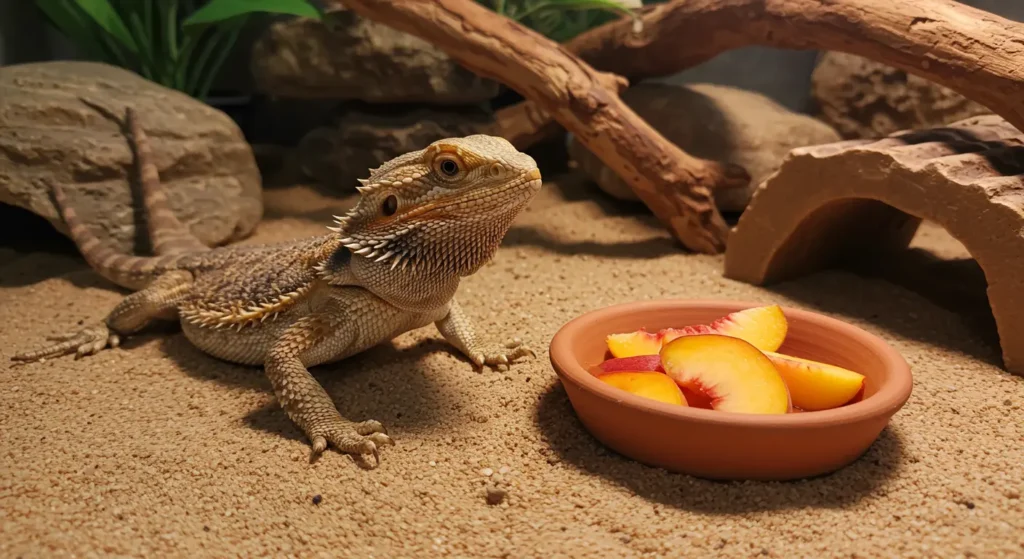
Serving frequency for adult and juvenile bearded dragons
The feeding peaches to baby bearded dragons should be done very carefully and infrequently. Baby dragons need a protein-rich diet to support their rapid growth, so fruits like peaches should only appear rarely—no more than once or twice a month. Introducing peaches too often can disrupt their nutritional balance and lead to digestive upset. For adult dragons, peaches can be offered more regularly but still in moderation. An adult bearded dragon diet peaches can include peaches about once a week, but only as a small treat alongside their main diet of vegetables and insects. The fruit feeding frequency depends on your dragon’s age, health, and dietary needs. Always start with small amounts and observe how your dragon reacts. Adjust accordingly to avoid overfeeding sugary foods. Consulting a reptile vet or experienced breeder can help you tailor a feeding schedule that supports your pet’s optimal health throughout its life stages.
Warning signs your bearded dragon is reacting badly to peaches
When introducing peaches into your bearded dragon’s diet, it’s essential to watch for any signs of distress or bearded dragon digestive issues. Symptoms such as diarrhea, lethargy, loss of appetite, or unusual stool could indicate an intolerance or fruit allergies reptiles might experience. Other warning signs include bloating, vomiting, or changes in behavior. These symptoms suggest your dragon may not tolerate peaches well and needs an adjusted diet. Careful monitoring reptile diet during new food introductions helps catch these problems early, allowing you to stop feeding peaches before they cause serious health concerns. If your bearded dragon shows any negative reactions after eating peaches, remove the fruit immediately and consult a veterinarian with reptile expertise. Early intervention helps prevent complications and ensures your pet remains healthy. Always prioritize your bearded dragon’s well-being by carefully observing how they respond to new treats like peaches.
Healthy Fruit and Vegetable Alternatives to Peaches for Bearded Dragons
Offering a balanced diet for bearded dragons means including a variety of safe fruits and vegetables beyond peaches. Incorporating safe fruits for bearded dragons and nutrient-rich vegetables for bearded dragons ensures your pet gets essential vitamins and minerals. Along with staple greens like collard and mustard greens and protein sources such as Dubia roaches, a diverse diet supports overall health and vitality.
Other safe fruits for bearded dragons (blueberries, apples, mango)
Choosing safe fruits is important to keep your bearded dragon healthy and happy. Blueberries are an excellent choice because they are rich in antioxidants, vitamins, and fiber. They provide natural sweetness without overwhelming sugar content. Apples are also safe for bearded dragons when seeds are removed, as the seeds can be toxic. Apples add variety to the diet and supply beneficial nutrients, including vitamin C and fiber. Mangoes are another tasty option but should be fed in moderation due to their higher sugar levels. Like all fruits, they should be washed thoroughly and cut into small pieces to avoid choking hazards. While these fruits can be nutritious treats, they must only make up a small portion of the overall diet to avoid upsetting the calcium-to-phosphorus balance crucial for bone health. Offering a variety of safe fruits like blueberries, apples, and mangoes helps maintain a balanced diet and keeps your bearded dragon interested in its meals.
Staple vegetables and greens for daily bearded dragon feeding
Leafy greens and vegetables should form the bulk of your bearded dragon’s daily diet. Collard greens, mustard greens, and dandelion greens are among the best options because they are rich in calcium, fiber, and essential vitamins. These greens help maintain strong bones and promote healthy digestion. Collard greens have a particularly good calcium-to-phosphorus ratio, which supports bone density and prevents metabolic bone disease. Mustard greens add variety and similar nutritional benefits. Vegetables such as bell peppers and butternut squash can be included occasionally for added vitamins and minerals. Avoid feeding high-oxalate greens like spinach or kale too frequently, as they can interfere with calcium absorption. Always wash vegetables thoroughly, chop them into manageable pieces, and offer a mix of different greens to provide a range of nutrients. A diet rich in vegetables ensures your bearded dragon receives balanced nutrition essential for long-term health.
Adding insects and proteins for a balanced bearded dragon diet
Protein plays a crucial role in supporting your bearded dragon’s growth and overall health. Live feeder insects like Dubia roaches are an outstanding choice, providing a rich source of protein and essential nutrients. These roaches have a favorable calcium-to-phosphorus balance, which supports healthy bone development when properly gut-loaded. Alongside Dubia roaches, crickets, mealworms, and black soldier fly larvae can also be incorporated, but in moderation, as some insects have higher fat content. Younger bearded dragons need protein-rich meals more frequently to fuel their rapid growth, while adults benefit from a diet with a higher proportion of vegetables and fewer insects. Remember to dust insects with calcium powder to prevent deficiencies that could affect your pet’s skeletal health. Including a variety of insects ensures your bearded dragon receives diverse nutrients, helping maintain optimal muscle strength, immune function, and energy levels throughout its life.
Conclusion
To wrap up, the question can bearded dragons have peaches requires careful consideration of the fruit’s nutritional benefits and potential risks. Peaches provide essential vitamins and minerals but contain sugars and an imbalanced calcium-phosphorus ratio that limit how often they should be offered. When feeding peaches, prioritizing fresh, properly prepared fruit ensures your bearded dragon’s safety. These fruits serve best as an occasional addition, complementing a diet centered on nutrient-dense leafy greens, vegetables, and protein-rich insects. Monitoring your pet’s response when introducing peaches will help maintain their overall health and wellbeing. Thoughtful dietary choices are key to supporting a long, vibrant life for your bearded dragon, making treats like peaches a smart and enjoyable supplement.

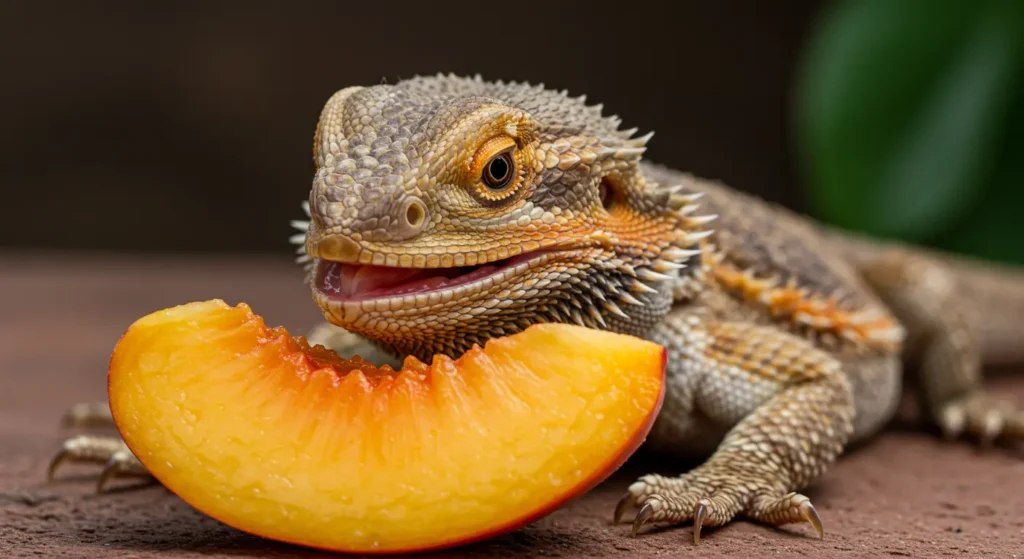

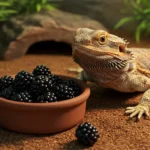
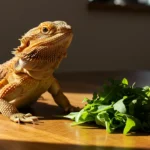
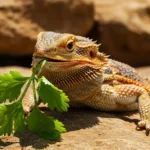
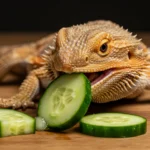
1 thought on “Can Bearded Dragons Have Peaches? A Sweet Treat They’ll Love”